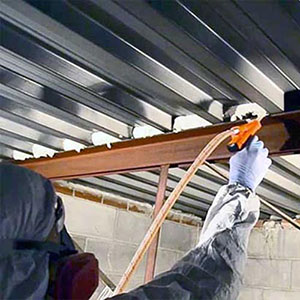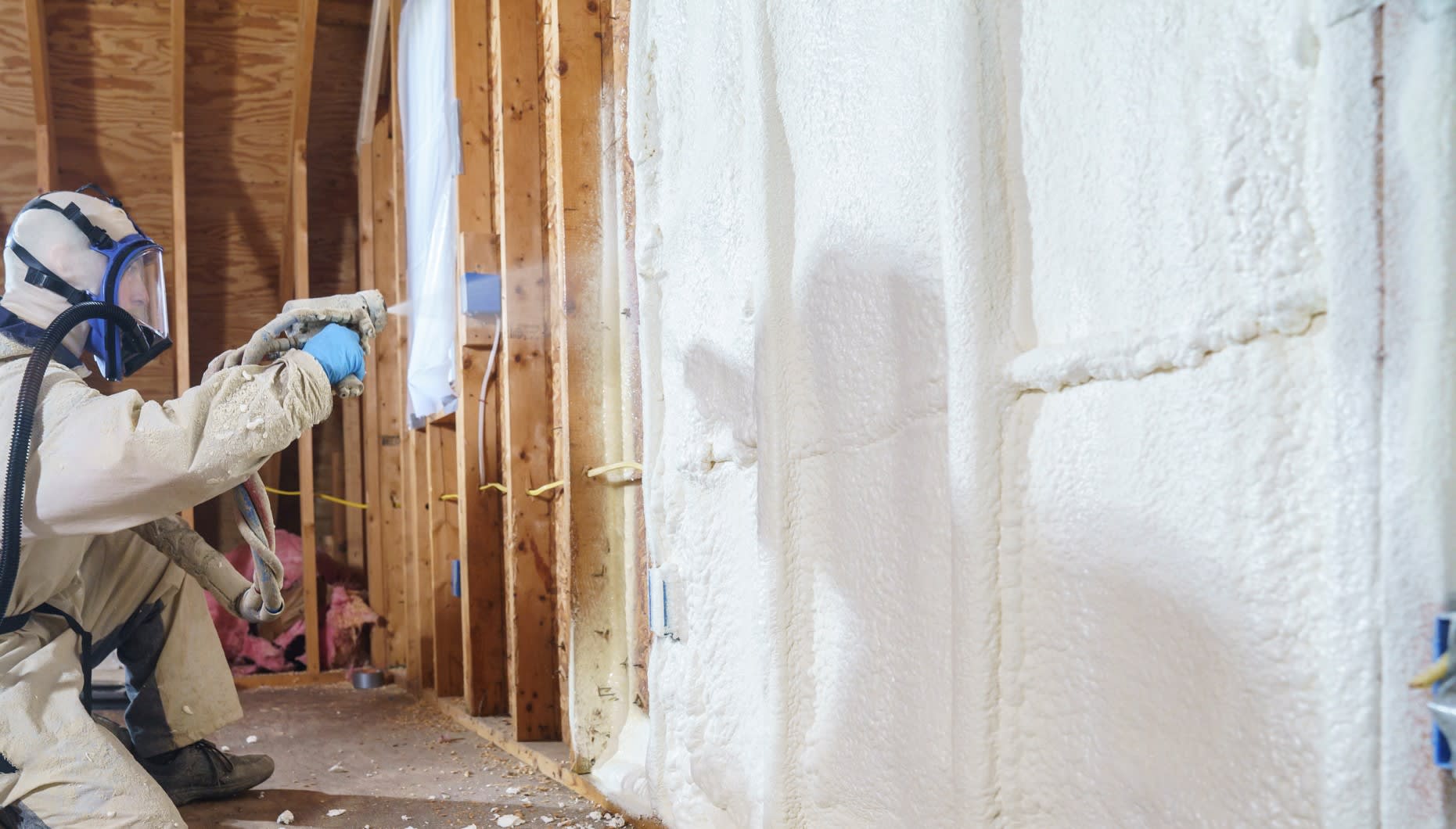Usual Misconceptions Concerning Spray Foam: Debunking the Misconceptions
Spray Foam: The Ultimate Solution for Air Sealing and Insulation
Spray foam insulation has actually become a leading service for effective air sealing and thermal insulation, providing a special combination of residential or commercial properties that set it apart from conventional methods. Its ability to expand and load voids makes it specifically efficient in preventing air leak, which can considerably affect energy performance. Comprehending the complete extent of its advantages, installation processes, and contrasts with other insulation kinds is crucial for making educated choices. As we explore these aspects, the effects for both brand-new constructions and retrofits become increasingly substantial. What aspects should affect your option?
What Is Spray Foam?
Spray foam is a flexible insulation product that incorporates the principles of air securing and thermal resistance to enhance power efficiency in buildings. Made up mostly of polyurethane or various other comparable substances, spray foam is used as a liquid that expands upon contact with surface areas, creating a strong, constant layer of insulation. This special building permits it to fill up voids, fractures, and spaces that conventional insulation products might overlook, providing an exceptional air seal.
There are two primary kinds of spray foam: open-cell and closed-cell. Open-cell spray foam is lighter and a lot more versatile, supplying superb noise absorption and a lower R-value per inch - Spray Foam. In contrast, closed-cell spray foam is denser, providing a greater R-value, dampness resistance, and included structural integrity to developing elements
The application process usually entails specific tools, making sure a seamless application that sticks to various substrates, consisting of steel, timber, and concrete. This flexibility makes spray foam appropriate for both new constructions and retrofitting existing structures. Its ability to produce a closed obstacle significantly adds to lowering power consumption and improving indoor air high quality, thus making it a favored choice among builders and property owners alike.
Benefits of Spray Foam Insulation
Among the most substantial advantages of spray foam insulation is its extraordinary capacity to develop a constant air obstacle, which efficiently minimizes power loss. Unlike conventional insulation products, spray foam increases to fill up gaps and splits, making certain that air leak is considerably lowered. This particular not only enhances power effectiveness however likewise results in lower utility bills with time.
Furthermore, spray foam insulation supplies exceptional thermal resistance, adding to a much more secure indoor setting. Its high R-value per inch enables effective insulation in restricted rooms, making it excellent for attics, wall surfaces, and crawl spaces. Moreover, the moisture-resistant residential properties of spray foam help stop mold and mildew and mold development, advertising much healthier living conditions.
Another essential benefit of spray foam insulation is its sound-dampening high qualities (Spray Foam). It effectively lowers noise transmission in between rooms, developing a quieter and extra comfortable home atmosphere. The longevity of spray foam additionally stands out, as it does not sag or clear up with time, maintaining its efficiency throughout its life expectancy
Just How Spray Foam Works
Recognizing just how spray foam insulation works is crucial for valuing its effectiveness in air sealing and thermal resistance. Spray foam insulation consists of 2 key elements: isocyanate and polyol resin. When these parts are mixed, they go through a chemical response that creates the product to expand rapidly, creating a dense foam that loads gaps, fractures, and cavities.
As the foam broadens, it adheres to surface areas, developing a closed seal that dramatically reduces air infiltration. This characteristic makes spray foam insulation highly efficient at protecting against drafts and moisture penetration, which can lead to power loss and damage over time. Additionally, the closed-cell variant of spray foam uses remarkable thermal resistance due to its inflexible framework, effectively lessening warmth transfer.
The special homes of spray foam permit it to adapt to irregular surfaces, making sure thorough insurance coverage and a seamless barrier. Because of this, spray foam insulation not just improves energy effectiveness however also adds to boosted interior air top quality by minimizing the accumulation of toxins and irritants. Inevitably, recognizing the technicians behind spray foam emphasizes its function as a remarkable choice for insulation and air sealing in both commercial and residential applications.
Installment Process Overview

Prior to installment, the area has to be adequately cleaned up and prepped, making certain find more information that surface areas are devoid of dust, particles, and wetness. This step is important because contaminants can jeopardize attachment and overall performance. Once the location is prepared, the application entails blending both parts of the spray foam, which increases upon call and loads spaces successfully.
Educated specialists ought to perform the setup, utilizing specialized equipment to guarantee uniform coverage and ideal density. Safety safety measures, consisting of using protective gear and making certain proper ventilation, are imperative during this procedure. After application, the foam typically treatments promptly, creating a solid barrier that boosts power efficiency.
Comparing Spray Foam to Conventional Insulation
When examining insulation options, spray foam insulation stands out in comparison to conventional materials such as fiberglass and cellulose. Unlike fiberglass and cellulose, which can permit air seepage, spray foam increases upon application, loading voids and holes to develop a closed seal.
Furthermore, spray foam gives a higher R-value per inch than standard insulation kinds, offering more effective thermal resistance in a thinner account. This particular is especially read the full info here useful precede with limited tooth cavity deepness. Spray foam is resistant to dampness and mold and mildew development, which can be a significant issue with cellulose and fiberglass, particularly in moist settings.
However, spray foam insulation commonly brings a higher upfront cost than its typical equivalents. Home owners must evaluate this first financial investment against lasting energy financial savings and performance benefits. Inevitably, while both insulation kinds offer their function, spray foam emerges as a much more innovative service for modern insulation needs, particularly in terms of air sealing and thermal performance.

Verdict
In summary, spray foam insulation represents a very reliable service for achieving optimal air sealing and thermal resistance. Its special homes, consisting of wetness resistance and sound dampening, make it suitable for different applications in both new constructions and retrofitting tasks (Spray Foam). Although the initial expenses may be greater contrasted to conventional insulation materials, the long-term benefits, such as substantial power savings and boosted indoor air quality, warrant the financial investment and underscore its value in modern-day building practices.
Spray foam insulation has actually arised as a leading solution for effective air sealing and thermal insulation, providing an unique combination of homes that set it apart from conventional techniques.Spray foam is a versatile insulation material that incorporates the concepts of air sealing and thermal resistance to boost link power effectiveness in structures.When assessing insulation choices, spray foam insulation stands out in contrast to traditional products such as fiberglass and cellulose. Ultimately, while both insulation kinds serve their function, spray foam arises as a much more advanced remedy for contemporary insulation demands, especially in terms of air sealing and thermal efficiency.
In summary, spray foam insulation stands for a highly reliable solution for achieving optimal air sealing and thermal resistance.